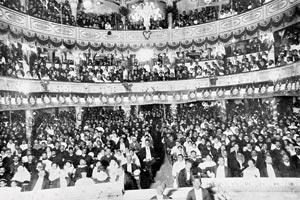Vishnudas Bhave, the pioneering theatre persona who modernised his industry in Mumbai, will be the focus of an upcoming talk by historian Murali Ranganathan


Vishnudas Bhave. Pic/Premji Sosa
ADVERTISEMENT
The next time you book your tickets for a play, think of this name: Vishnudas Bhave. An important figure in the history of Indian theatre, Bhave is best known for his pioneering work in the mid-1800s. Born in Sangli, Bhave arrived in Mumbai in 1852, only to change the face of not just Marathi theatre, but the whole infrastructure surrounding the industry. "He didn't invent theatre, but he certainly innovated it," says historian and researcher Murali Ranganathan.
Bhave will form the core of a talk on the modernisation of theatre in Mumbai that Ranganathan will deliver this Friday as part of arts and science conversation platform, Mumbai Local's first curated session by playwright Ramu Ramanathan. For over a decade, Ranganathan has been extensively researching the history and development of the entertainment industry in Mumbai, and this session is a leaf borrowed from the pages of his larger project. He says, "Bhave looked at the theatre infrastructure available in then-Bombay. He decided that, instead of staging plays in the backyards of the rich or through building temporary sheds, where people could just walk in, he could change the non-ticketed scene to actually charging for plays at Grant Road Theatre."

Interiors of Grant Road theatre. Pic/Drama Queens Representation purposes
The Bhave-fication of theatre in Mumbai also meant that people wanted value for money. Before Bhave's arrival, says Ranganathan, instead of tickets, an aarti plate was passed around at the end of a show, on which people would place a patron sum voluntarily. "Buying a ticket meant that audiences expected more from plays. Hence from semi-religious plots, the plays shifted to pure entertainment," he explains. A byproduct of this entertainment factor was the introduction of the genre of farce, in which the foibles of the rich and contemporary issues were critiqued through the veil of humour. Bhave and his company staged farces on widow remarriage, children's education, English missionaries, and, oddly, a cautionary tale to raise awareness on a series of murders of children that happened for robbing them of jewellery.
Stating that he is interested in "excavating" libraries with an archaeologist's enthusiasm, Ranganthan's research draws extensively from news archives. The reason is that Bhave's methods paved the path for previews, reviews, and ads, many of which are to be found in these archives. "Mumbai's theatre scene in the 20th century has been well-researched, but the times before that still need more work," says Ranganathan. He adds that his talk will also cover other theatre groups that followed Bhave's suit, a maverick balloonist who drives mass entertainment, and how practices like yoga caught the modern imagination. It all sounds intriguing, and best heard from Ranganathan himself.
Where: Kitab Khana, Somaiya Bhavan, Flora Fountain, Fort
When: May 18, 5.30 PM
Free
Call: 61702276
Catch up on all the latest Mumbai news, crime news, current affairs, and also a complete guide on Mumbai from food to things to do and events across the city here. Also download the new mid-day Android and iOS apps to get latest updates
 Subscribe today by clicking the link and stay updated with the latest news!" Click here!
Subscribe today by clicking the link and stay updated with the latest news!" Click here!






